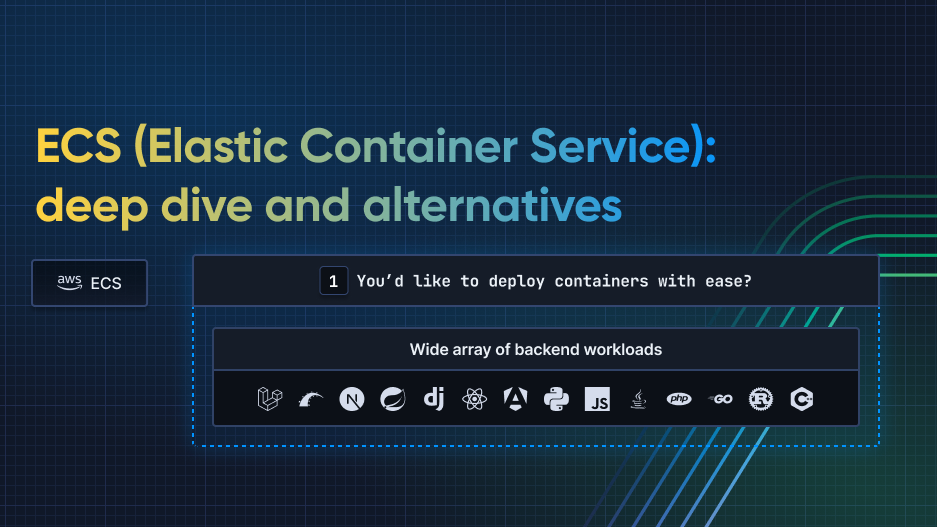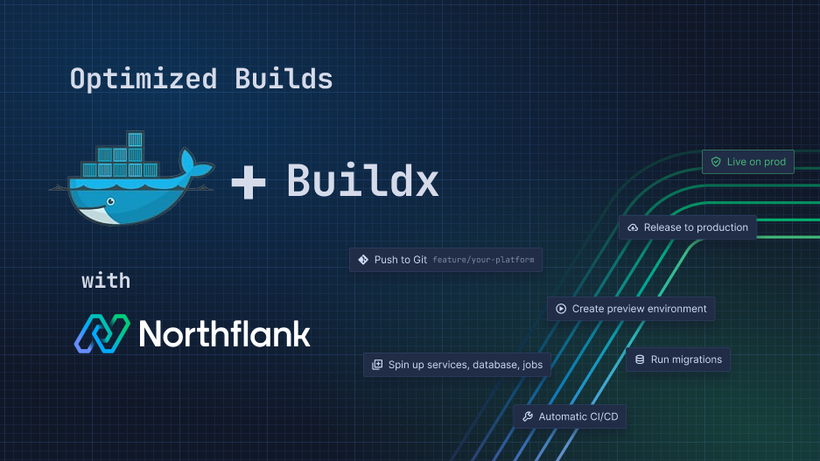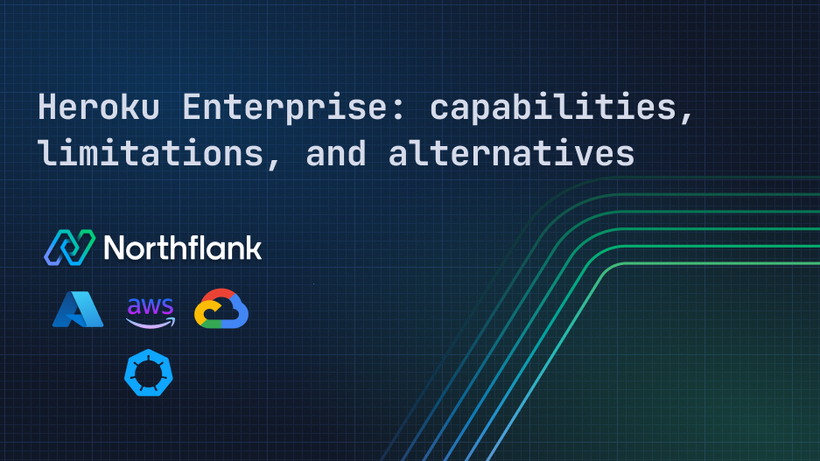

ECS (Elastic Container Service): deep dive and alternatives
When getting started with containerization, Elastic Container Service (ECS) often feels like the perfect starting point. It handles the basics well - getting your containers up and running, making sure they stay healthy, and connecting them with other services you're already using. The promise of managed container orchestration makes those first steps into the container world feel less daunting.
But here's the thing - as your team grows and your applications become more sophisticated, ECS begins to reveal its limitations. Those simple container deployments turn into complex juggling acts, involving multiple services, complex configurations, and time-consuming operational tasks. Many teams find themselves asking: "Isn't there a better way to do this?" Let's dive deeper into ECS and explore ECS alternatives that might better suit your needs.
Elastic Container Service (ECS) is a fully managed container orchestration service that helps teams deploy, manage, and scale containerized applications. Think of it as the command center that handles the complex coordination needed to keep your containerized applications running smoothly. ECS acts as a control plane that handles container scheduling, cluster management, and task coordination.
While ECS handles the orchestration layer, Fargate steps in as AWS's serverless compute engine that powers your containers, eliminating the need to manage servers and letting you focus purely on your applications. This pairing is powerful because it combines ECS's orchestration capabilities with Fargate's serverless infrastructure, meaning you can run containers without worrying about the underlying server management.
When you're working with ECS, you actually have two ways to run your containers. You can either manage your own cluster of EC2 instances (what we call the EC2 launch type) or let AWS handle everything through Fargate (the Fargate launch type). The choice between these two approaches comes down to how much control you need over your infrastructure versus how much operational overhead you're willing to handle.
ECS excels in running web applications and microservices, particularly for teams already using AWS. It has deep integration with services like application load balancers and IAM making it a natural choice for containerized applications that need automatic scaling, service discovery, and reliable task scheduling.
When it comes to deploying applications, ECS serves as your runtime environment—the place where your containers actually live and run. But here's what's interesting: ECS itself doesn't handle the entire release process. You can think of ECS as the final destination for your containers, but you'll need to figure out how to get them there.
In a typical deployment pipeline, your application code goes through several stages: building, testing, packaging into containers, and deployment. ECS handles that last mile—taking your container images and running them according to your specifications. You'll need to set up your own CI/CD pipeline using tools like Jenkins to automate the journey from code commit to container deployment on ECS.
ECS has earned its popularity for good reasons. For teams already invested in AWS, it feels like a natural extension of their existing infrastructure. The learning curve isn't too steep - if you understand basic container concepts, you can get started with ECS relatively quickly. The tight integration with other AWS services means you can easily set up load balancers, handle permissions through IAM, and monitor your applications using CloudWatch.
The pricing model is another attractive feature. You only pay for the compute resources you use, and when paired with Fargate, you can achieve true pay-per-use container execution. For many teams, especially those just starting with containers, this combination of simplicity and cost-effectiveness makes ECS an appealing choice.
As your containerized applications grow more sophisticated, ECS's simplicity can become a double-edged sword. Let's dive into some key limitations that teams often encounter:
- Day-to-Day operations: ECS provides basic container orchestration, but it leaves many operational concerns up to you. There's no built-in solution for automated scaling based on custom metrics, and managing backups or ensuring zonal redundancy requires significant additional configuration. The platform doesn't offer native support for stateful services or scheduled tasks, which means you'll need to build these capabilities yourself or rely on external tools.
- Developer experience: While ECS handles container execution well, it doesn't provide a comprehensive developer experience out of the box. There's no integrated CI/CD solution, meaning you'll need to piece together your own deployment pipeline. Secret management isn't built in, so you'll need to figure out how to securely handle sensitive information like API keys and database credentials.
- Observability challenges: Monitoring and troubleshooting in ECS can be challenging. While CloudWatch provides basic metrics, getting deep insights into your application's behavior often requires additional tooling. The observability story isn't first-class - you'll find yourself stitching together various services to get a complete picture of your application's health and performance.
- Stateful services: ECS presents significant challenges for stateful applications. Teams must manually configure persistent storage using Amazon Elastic File System (EFS) or Amazon Elastic Block Store (EBS), each with unique complexities. EFS provides shared storage across tasks, while EBS volumes are tied to specific EC2 instances, requiring careful volume management and data durability strategies.
- Scheduled tasks: ECS lacks native support for scheduled tasks. Instead, teams must integrate Amazon EventBridge (formerly CloudWatch Events) and manually configure cron-like schedules for task execution. This means building custom solutions for recurring jobs like data processing, backups, or batch tasks, adding another layer of operational complexity to container management.
As teams scale their containerized applications, they often find themselves bumping up against ECS's fundamental limitations. One of the most significant challenges stems from ECS's nature as a proprietary AWS service. Unlike open container orchestration platforms, ECS follows its own unique approach that doesn't align with broader industry standards.
This proprietary nature becomes particularly apparent when we look at Kubernetes integration. ECS can't run Kubernetes workloads because it's built as AWS's own container orchestration system, completely separate from the Kubernetes ecosystem. For teams that want to adopt cloud-native practices or leverage Kubernetes tools and patterns, this limitation often becomes a dealbreaker.
The operational challenges also compound as applications grow. Consider a team trying to implement a canary deployment - where you gradually roll out a new version to a small subset of users. In Kubernetes, this is a well documented pattern with built-in support. In ECS, you'll need to build this capability yourself, often through a complex combination of custom scripts and additional AWS services.
These limitations create a snowball effect. As your application scales, you'll find yourself spending more time building workarounds for capabilities that come standard on other platforms. Tasks that should be straightforward, like splitting traffic between different versions of your application or implementing sophisticated deployment strategies, require significant custom development effort in ECS.
When teams reach this point, they realize they're investing more time managing ECS's limitations than building and improving their applications. This realization usually marks the beginning of their search for more flexible and capable container orchestration solutions.
When teams outgrow ECS's limitations, they typically explore a few different paths. Let's examine each approach and understand why teams often find themselves looking for something more comprehensive.
Many teams first consider serverless platforms like AWS App Runner, Azure App Service and Google Cloud Run. These platforms promise to eliminate infrastructure management entirely - an appealing proposition for teams feeling overwhelmed by ECS's operational demands. However, teams quickly discover new constraints: runtime environments are restricted, deployment patterns are limited, and scaling costs can become unpredictable.
Some organizations, particularly larger enterprises, opt to build their own platform on Kubernetes. This path seems attractive because it offers complete control over the container infrastructure. However, the reality of managing a Kubernetes platform is complex. Even with managed services like EKS, organizations need dedicated platform teams to handle infrastructure, security, and developer tooling. The initial investment is substantial, and the ongoing maintenance requires specialized expertise that's increasingly difficult to hire for.
At Northflank, we've carefully studied how teams evolve beyond ECS, and we've built our platform to address these challenges comprehensively. We understand that teams want advanced capabilities like sophisticated deployment strategies and cross-cloud flexibility, but they don't want to manage complex infrastructure or piece together multiple tools.
Our platform provides everything growing teams need: integrated CI/CD pipelines, robust observability tools, and native support for stateful services. You can implement canary deployments, split traffic between versions, and manage secrets across environments - all through an intuitive interface that maintains the simplicity teams initially loved about ECS.
What sets our approach apart is how we've maintained simplicity while delivering power. Teams can deploy across any cloud provider and implement advanced deployment strategies without becoming infrastructure experts. We've built the platform we wished existed when we were scaling our own applications - one that grows with your needs without growing in complexity.
For teams ready to move beyond ECS, the choice ultimately comes down to your priorities. If you're looking for a platform that combines the simplicity of serverless with the power of Kubernetes, without the operational overhead of building your own platform, we'd love to show you how Northflank can help. Schedule a live demo here, or get started with Northflank here.


